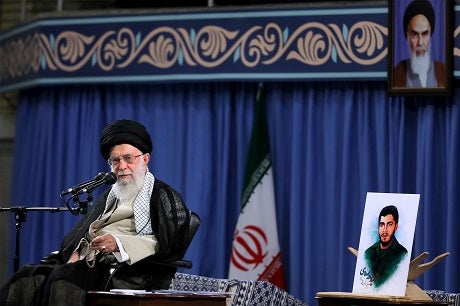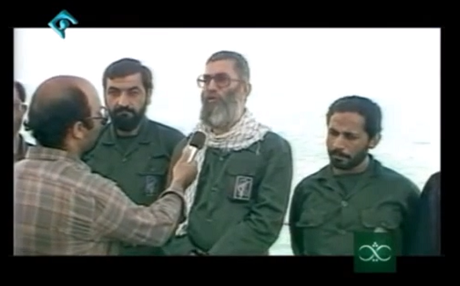When the Iranian ambassador to the UK agreed to be interviewed on BBC Radio to talk about the Joint Comprehensive Plan of Actions (JCPOA), he thought it was a straight-forward affair since as a seasoned diplomat he had been one of the main negotiators of the 2015 landmark nuclear deal.
Hamid Baeidinejad explained on May 17 that Iran would not hesitate to take further steps once the two month ultimatum which Tehran gave to the remaining members of the nuclear deal earlier this month, runs out: “…I assure you that these steps are within the boundary of the JCPOA. We are not deciding at this moment to withdraw from the deal. Of course that could be among the options that we would be studying.”
This was enough to unleash a torrent of abuse by Iranian hardliners on social media and from their main mouthpiece, Kayhan newspaper. “Mr Ambassador! Your duty is to warn Europe and not to send feeble messages,” the main headline read two days after the interview. The government’s official news agency, IRNA, responded on Tuesday by questioning the wisdom of such attacks on Iranian diplomats at a time when Iran is fighting an “uneven” war with its enemies.
This incident is a potent reminder of the growing quarrel between the Islamic Revolutionary Guard Corps (IRGC) and hardliners with the government of President Hassan Rouhani whose diplomats are stuck trying to find a way out of the current impasse with the United States. Rouhani is under extreme internal pressure as the inflation rate and unemployment level are skyrocketing threatening millions of low-income Iranians.
Supreme Leader Ali Khamenei speaks to hardline students on May 22, 2019, as a poster of the Nader Mahdavi who hunted US warships and oil tankers in 1987 sits in the background. Photo: Khamenei.ir
On Wednesday, Supreme leader Ali Khamenei distanced himself from the nuclear deal and displayed the poster of a young guard who hunted US warships and oil tankers during the Tanker Wars in the 1980s — an ominous sign that the dispute will deepen further.
“I did not believe much in the way the JCPOA was negotiated and materialised, and on many occasions I told the officials including Mr. President and the respected Foreign Minister...” Khamenei told a group of hardline student leaders on Wednesday.
This is bad news for Rouhani as the supreme leader appears to be siding with the guards and toughening his position.
The poster of Nader Mahdavi, the IRGC young guard who was killed by Americans allegedly under torture, carried an underlying message: The hardliners will not budge. Khamenei’s tone these days is reminiscent of his old rhetoric. In July of 1987, Khamenei who was president at the time, had gone to the Persian Gulf in IRGC fatigues patting young guards on the shoulder as they used fast boats and RPGs to strike at ships one after another.
“This is an international waterway and if they [foreign ships] don’t interfere, they can come and go and no one would violate them” Khamenei had warned. “We don’t want to be the one who starts causing tension, but if they plan to create tension and be provocative... There is no doubt there will be a clash and, as I said, in such a clash their vulnerability is great.”
Ali Khamenei surrounded by the head of IRGC at the time Mohsen Rezaei (left) and Mohsen Rafiqdoost, the minister of the IRGC in July 1987 in the Persian Gulf.
While President Trump repeatedly has said he is not interested in launching another costly war, he has nonetheless threatened to retaliate against the Iranians with ferocity if they make a “big move.”
The truth is the government of President Rouhani has no power over the activities of the IRGC which is the force at the heart of the dispute between Washington and Tehran. The guards under Khamenei’s control felt left out when the nuclear deal was signed in 2015, but the fact that they were not part of the deal meant that they could still continue with their activities in regional countries ranging from Syria to Yemen.
“Trump and the Islamic State militants were gifts from God to the IRGC,” a senior Rouhani government official fearing the ascendancy of the guards during Trump’s presidency told Reuters in late 2016 — prior to him assuming office.
Now that the guards appear to have gained the upper hand, their relentless media attacks on the government have intensified as Rouhani struggles to cope with the ramifications of Trump effectively unilaterally scrapping the nuclear deal.
It appears that Kayhan newspaper, backed by the IRGC, is interested in fueling conflict with Washington and America's regional allies. The paper does not shy away from running offensive, provocative headlines targeting perceived internal foes, external enemies and expressing vociferous support for organizations such as the Houthis in Yemen, Hezbollah in Lebanon, and Shiite militias in Iraq.
“Ansar Allah fires a missile at Riyadh, next target, Dubai,” said Kayhan on its front page on November 4, 2017 when the Houthis — known officially as Ansar Allah — fired a ballistic missile at Riyadh airport.
The UN sanction monitors said in a report that the missile originated from the IRGC and most likely was smuggled into Yemen using “ship-to-shore transshipment to small dhows …”
Kayhan reacted similarly following recent sabotage operations on four vessels in the strategic port of Fujairah near the Strait of Hurmuz and the audacious armed drone attack on Riyadh by the Houthis. The newspaper said the sabotage operation on the vessels has deprived the “backward sheikhs" of the Gulf region of their sleep and repeated the same message from Ansar Allah that Emirati cities were within range of the group’s armed drones. One pro-IRGC tweet from Iran described the attack as ‘divine intervention” which has resulted in “fear and surprise at this mysterious military power.”
One place where this rivalry could create real headache for Rouhani’s government is Iraq — where some groups within the Popular Mobilization Forces (PMF), also called the Hashd al-Shaabi, often launch blistering verbal attacks on the Trump administration.
In his Q1 2019 report, the Pentagon Inspector General mentioned at least three incidents which the PMF had come in contact with Americans and a clash almost occurred. “The Iraqi Popular Mobilization Forces continue to present a challenge for Coalition counter-ISIS and security sector reform efforts,” the inspector said…a PMF checkpoint forced a Coalition reconnaissance unit to turn around while traveling to support a meeting with an Iraqi official near the Sinjar Mountains [in Nineveh province].”
Iranian guards always insists they will not abandon their “strategic depth” — meaning their influence in the neighboring countries in order to protect the revolution back home. For these guards, Yemen, Iraq, Syria and Lebanon are their first line of defense.






Comments
Rudaw moderates all comments submitted on our website. We welcome comments which are relevant to the article and encourage further discussion about the issues that matter to you. We also welcome constructive criticism about Rudaw.
To be approved for publication, however, your comments must meet our community guidelines.
We will not tolerate the following: profanity, threats, personal attacks, vulgarity, abuse (such as sexism, racism, homophobia or xenophobia), or commercial or personal promotion.
Comments that do not meet our guidelines will be rejected. Comments are not edited – they are either approved or rejected.
Post a comment